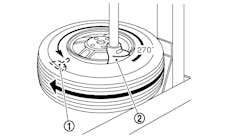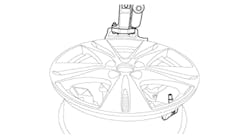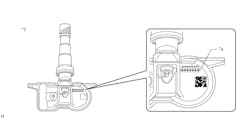Increased tire sales -- in February, no less -- did not give Bill Schwartz the warm fuzzies. Not at all.
How can this be? As the owner of State's Tire in McKeesport, Pa., he has experienced increased sales due to pothole damage. He doesn't turn down the business, but has a lot of empathy for his customers. As he says in the recent Tire Dealers Association of Western Pennsylvania Newsletter, pothole damage causes frustration, heartache and negative feelings among car owners, all problems tire dealers have to deal with when servicing them.
"While I’m sure we’d all prefer business from a different cause, at the end of the day... we have to deal with what’s in front of us," he wrote in the newsletter. As president of the association, he did more than just write about the issue. He tried to turn a negative into a positive.
In his President's Message, he offered plenty of sage advice on how to not only solve some of those problems, but also avoid some of them. Here's what he had to say.
"As independent operations in Western Pennsylvania, it’s been challenging to deal with such obstacles while maintaining customer relations (and) fixing and finding wheels and tires. When dealing with these situations created by damages, you may often find yourself practicing new ways to solve problems.
"Prevention may have been the winner this month. To eliminate some of the hostile behavior that follows these issues, it may be within interest to have your staff evaluate wheel and tire assemblies prior to bringing items into your shop. Much of the damages from potholes and road conditions are often completely unknown to our customer.
"It’s also come to my attention that many of the individuals who are experiencing pothole damage(s) are sometimes not the individuals putting spares on. I bring this to (your) attention because it’s evident that there’s often inexperienced servicing of tires and wheels prior to reaching your shop. By training your staff to identify, evaluate, and predict outcomes prior to servicing, the problems often become smaller."
Tire pressure monitoring system (TPMS) issues can add to the aggrevation, he says.
"Although most consumers are familiar with this system, it does not gauge the severity of the issue, nor does it tell them 'not to drive the car' or 'pull over.' With that said, I believe a large portion of the damage(s) experienced by tires, wheels and sensors come from driving with inadequate air pressure.
"Education is key. Educate your customers to inspect the TPMS issues as soon as they arise. This may mean pull over and check or evaluate the vehicle. If a tire appears to be deficient in air, (they should) not drive! Repairing the damage to the car, the sensor(s), or tire(s) can... take up a large portion of a family budget.
"As a store owner, educate your staff. Look at assemblies and inspect tires and scan TPMS for responses prior to services. This will increase profitably, and relations in more ways than one could realize."


